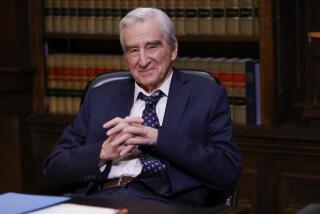Raymond Burr Dies; Played Perry Mason : Actor: He portrayed a crusading defense attorney in the popular TV series. He was also known for his role in the movie ‘Rear Window.’
Raymond Burr, who began his dramatic career portraying an unsavory assortment of hoodlums, killers and villains, and climaxed it as the legendary attorney who defended them, died Sunday night at his Sonoma County ranch. He was 76, and had been suffering from cancer, a friend said.
Although his movie roles often cast the heavyset Canadian-born actor as a bad guy--such as the murderer who menaced James Stewart in “Rear Window”--it was by television roles as the crusading defense attorney in “Perry Mason,” which ran for nine seasons, and later the wheelchair-bound San Francisco police detective in the series “Ironside,” that his fame was cemented.
So popular was the late 1950s-early 1960s lawyer series that won him two Emmys, that when the Perry Mason role was revived in a 1985 made-for-TV film, it earned the year’s highest ratings for such a movie, and prompted a Perry Mason revival. The TV show is still in reruns.
Burr completed his last Perry Mason film in mid-August in Denver, showing up on the set at 4 a.m. in a wheelchair. After the filming, he returned to his vineyards and farm in Northern California, where he died.
His friend Charles Macaulay said Burr’s doctor, Paul Margulio, gave the cause as metastatic cancer of the liver.
Six feet tall and deep-voiced, with mesmerizing eyes, Burr had tried his hand at virtually ever kind of acting, from the original camp classic “Godzilla” to the varied roles of a repertory theater tour of England in his youth, to a stint as a singer in a Paris nightclub before World War II.
Raymond William Stacy Burr was born in British Columbia in 1917, the eldest of three children of a Canadian hardware dealer and American organist. His parents divorced when he was 6, and Raymond grew up in Vallejo, Calif.
Later in life, he would recount how he had worked at many jobs to make ends meet, such as a stint on a New Mexico ranch at age 13, where he “mended fence, milked cows, helped with births of lambs and calves, and rode for miles.”
He served in the Navy during World War II, returning to Canada from his nightclub work at a Left Bank cafe called the Ruban Bleu, and made his film debut in “San Quentin” in 1946.
Unlike many in his craft, he was virtually never at a loss for work: His commanding figure and compelling eyes made him a natural for such roles as Montgomery Clift’s prosecutor in “A Place in the Sun,” the man who stalked Natalie Wood in “A Cry in the Night,” and the murderer Jimmy Stewart spots in “Rear Window.”
But it was television that made his deep-timbred voice and bulky figure famous, and made Burr wealthy.
If the formula of “Perry Mason” was always the same--the dedicated attorney outsmarting the prosecutor to see justice done, often in gripping witness stand revelations--it enthralled audiences, making him TV’s most successful lawyer for nine seasons, from 1957 to 1966. Even Pope John XXIII was a fan, and granted Burr an audience.
“Perry Mason went on the air when people were first buying television sets,” Burr said in an Associated Press interview this year.
“A lot of people in this country didn’t know what their legal system was all about. I’m sure just from the people who have watched the show over the years, particularly the minorities, they found out the system of justice was for them.”
He dismissed criticism by real attorneys (including many prosecutors, annoyed at seeing their side lose week after week) that such drama ruined people for the necessary tedium of real justice.
“Every bit of (Perry Mason) was within the framework of what could happen in a court in the county of Los Angeles or the state of California.”
Burr returned to law and order as the unflappable San Francisco detective in the 1960s-’70s series “Ironside,” and returned to Perry Mason in 1985, for the popular TV movie “Perry Mason.” But a brief series in which he played an investigative reporter, “Kingston: Confidential,” lasted only 13 episodes in 1977.
In the TV movies, Barbara Hale again played his loyal secretary--the two had known each other for a half-century, since their days at RKO--and at last Burr had something to say about the question viewers had been asking for nearly 30 years.
“People would say: ‘Is he sleeping with Della Street, and if not, why not?”’ Burr said this year. “Fifty percent of them want him to, and 50 percent don’t want him to. I try to play both 50 percents.”
Burr married three times. His first wife died in a plane shot down by the Nazis in World War II. He divorced his second wife, and his third wife died of cancer. His son died of leukemia at age 10.
Burr’s hobby was raising orchids; he developed thousands of kinds, and donated his collection to Cal Poly Pomona in 1982 when it outgrew his premises.
Burr is survived by Geraldine Fuller, his sister, who lives in Fairbanks, Alaska, and his longtime business associate and companion, actor Robert Benevides.
More to Read
The complete guide to home viewing
Get Screen Gab for everything about the TV shows and streaming movies everyone’s talking about.
You may occasionally receive promotional content from the Los Angeles Times.






